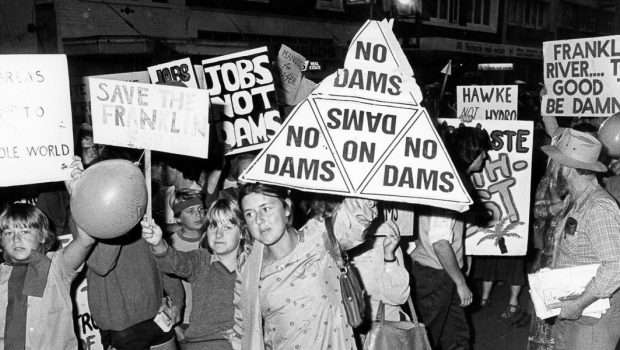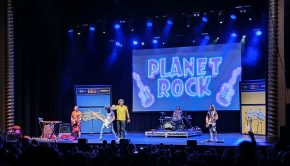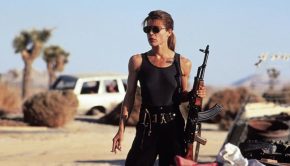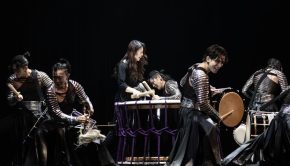MIFF 2020: Natural World: Environmental Activism on Screen
The Wheeler Centre, Sunday 7th August 2022
Moderator: Jacinta Parsons
Panellists: Karl Malakunas (Delikado), Chris Kamen & Oliver Cassidy (Franklin)
This was a last-minute addition for me after reading about it on the MIFF website and I was already sort of interested in Franklin and wanted to find out more about the other Delikado.
As this session is going to be uploaded to the MIFF YouTube channel after the festival, this will be more of a summary rather than an exact transcript of the session. I would encourage you to watch it as it had stuff on it that I cannot really show here like one of the directors crying two times. Jacinta Parson was a big meanie head for continuing that line of questioning at that point.
Both of these movies were pitched at the start of 2020 and took until now to be completed due to the closed borders and not much travelling being done.
Karl Malakunas: The movie is an envrio-thriller. A life and death battle with environmental activists.
Oliver Cassidy: My father passed away 10 years ago and I was left with a diary. Made over 14 years rafting the Franklin River.
His father apologised for not having done enough for the cause.
Retracted the journey and wanted to show how to apply the lessons to modern problems.
Chris Kamen: Oliver is a child of the revolution. They wanted to pass a message onto the younger generation. They decided to combine their efforts and make the film together after working on their own projects for a while.
Jacinta Parsons: What was the motivation for the work?
KM: My heart has always been in environmental reporting. Wanted to tell a story in a deeper way than he can usually do in his normal job at AFP.
Was originally going to do a story on environmental tourism but was recommended to go see the one person and the story grew from there.
JP: What motivates you to present a personal story?
OC: My father was very engaged with the cause when he was alive. Had to decide what he wanted to do once his father passed away.
JP: How did you get from the sidelines to becoming involved?
CK: It was a privilege to make a film and push the cause. The Franklin River story is one of the few ones that has a happy ending. It is difficult to tell a lot of these stories as a lot of them do not end up happily.
There is a new generation that needs to know the story of the Franklin River. It is a case study of how grass roots people and working towards a single goal can produce results.
JP: How can you be involved in the story without influencing how you tell the stories?
KM: Originally interviewed Bobby with the chainsaw tree and then met other people as the story evolved.
He was told to get in a van and go to the forest with the activists.
There was a mysterious guy Tata who was the leader and was doing hand signals and making bird calls who he was drawn to.
Went back on a confiscation mission after one of the activists was killed which was hard but important to do.
The third main character was someone who they met at the funeral for the activist. The local politician was put on the presidents “hit list” for drugs which was a proxy to get rid of people he didn’t like.
JP: How did you feel about covering the story of your own family?
OC: Was meant to be a number of different people when they first wanted to tell the story but over the time he realised it was just going to be he to be the one to tell it.
Transitioned while making the documentary so there is another journey as well as the one going down the river. It was made only three months after having the surgery so he still had bandages on in some scenes.
CK: Was working on the story for about seven years.
OC: Had a meeting with Bob Brown and then had to come out to Chris about being trans.
JP: On the question of activism and non-violence?
KM: Was a controversial decision to include the footage of the funeral but the family wanted it shown and the film maker wanted a way to have emotional stakes in the story so people would get involved in it.
The family has to bear the consequences of the persons activism as they were killed.
JP: How do you make decision about what to include?
CK: Looked at a famous book on non-violent action.
The Franklin River campaign was run by the playbook of non-violent action. It was not just about getting arrested. The campaign went for eight years.
Will never win by being violent as soon as you are you get the public offside.
OC: Protest is underpinned in the democratic system.
The film is being used to campaign again the various states new anti-protest laws as the more things change, the more things stay the same.
JP: How do you deal with personal danger but still make the story?
KM: My mum and my wife are in the audience so I was never in any danger (laughs). Went to the Iraq War in 2003 and they were concerned about his safety then.
The activists wanted a better world to leave for their children and it is more important than their own safety.
JP: You hurt your knee on the first day of going down the river. How do you reconcile this with making the story?
OC: It was about personal integrity. To believe in something and take action on it. People have died on the Franklin River but he still recommends people go there and experience it for themselves.
Was following a diary so he knew what was coming up on the river.
His father had a reputation as an outdoor adventurer.
JP: Is there a separation from the person and telling the story?
KM: All still pretty raw and emotional. Is a tale of heroism. It is great to be able to tell this story for people.
You need to tell as story with the people involved and not just take it from them and not give anything back.
Wanted to tell the story factually and emotionally.
JP: Is there a danger of mythologising the story?
OC: Was a tale of two sides but you don’t hear that as much today.
Told the story using the SELF / US / NOW tool.
Was harder to tell the story as a trans person as they had to be more aware of their own safety.
As the climate emergency depends there is more of an impact on people.
CK: Are making a mythology but it is very recognisable. Could easily have made a 20 part series out of this story.
Was only 6 people from the original campaign involved of over 1,200 people originally arrested during the protests.
The Upriver mob were the more radical, Wilderness Society organised and the Australian Conservation Society worked with the government behind the scenes.
How we understand the world is based on mythology. He gets much of his understanding of the Holocaust from the movie Schindler’s List.
Would like to have a debate about the Franklin River with someone who still believes it should have been dammed.
It was always not going to be told objectively as the conservationists won in this case.
“When you give a dam…”
The original protestors were told they were going to fail but still went ahead with it.
JP: Are the recent changes to the laws around protesting having an impact?
OC: It is a dark time and they need to be stood up against. There are now laws in NSW, VIC and also they are considering them in Tasmania.
The current fines are what he calls an “admin fee” for participating in democracy. The new fines and jail time are a serious attack on the democratic right to protest.
CK: Was more genteel back in the time of the Franklin River protests.
The anti-vaxx protests and the increased police powers in response have had an impact.
Protest is a healthy part of democracy.
OC: Not all police were pro-dam back in the day.
The police chief said to them before they went out “if you for the dam then arrest the bastards! If you are against the dam then arrest the bastards but do it on camera.”
KM: Land is still being clear-felled and they want to get the story told.







